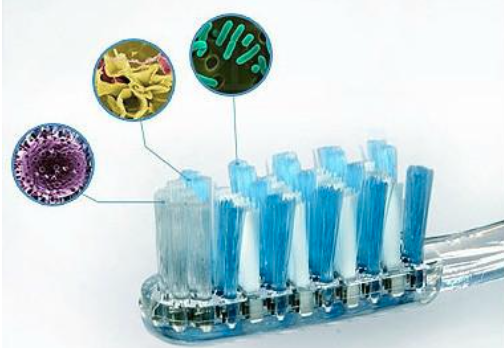Whether you are using a manual or an electric toothbrush, it is important to disinfect toothbrushes to control and prevent the spread of disease.
The human mouth is home to around 500 to 1,000 types of bacteria, some of the bacterias in the mouth are harmful and can cause serious illness. Individuals that practice oral hygiene have less bacteria living on each tooth surface, while less clean mouths can have between 100 million and 1 billion bacteria on each tooth. Dentists always tell us that the only way to improve oral health is by brushing your teeth two to three times a day. But, there is limited information given to the proper handling and sanitation of toothbrushes.
The Centers for Disease Control and Prevention (CDC) suggests:
- Replacing your toothbrush or toothbrush head (if you are using an electric brush) every two to three months or whenever there is evidence of damage to the bristles.
- Do not share your toothbrush. Toothbrushes harbor a lot of infectious organism and can be a breeding ground for bacteria. It can potentially increase the risk of infection in Immune-suppressed patients.
- After brushing, rinse your brush with running water thoroughly. You do not need to soak your toothbrush in an antibacterial mouthwash.
Toothbrush Sanitizing

Although, there is no clinical evidence linking contaminated toothbrush to recontamination of a user’s mouth, it is still important to know how to effectively clean them.
“A human mouth is home to about 500 to 1,000 types of bacteria.”
5 Ways to disinfect your toothbrush:
- Store your toothbrush in a cup of hydrogen peroxide mixed with water. Peroxide has been used as an antiseptic since the 1920’s and its bactericidal effect inhibits the growth of bacteria from one species to the other.
- Soak with an effervescent denture cleanser. Denture cleanser contains dilute sodium hypochlorite and has anti fungal properties.
- Always give your toothbrush some air. One of the most important habit is to always allow your toothbrush to completely dry between uses to prevent molds.
- UV sterilization or ultraviolet germicidal irritation, has been found to be extremely effective in killing over 99% of viruses, bacteria and fungi in a short amount of time.
- Toothbrush protectors is the most natural way to keep your brushes clean. Clip-on toothbrush protectors like Steripod has antiseptic properties from natural plant extract thymol. Thymol which comes from the thyme plant is also used in many mouthwash formulations as an antimicrobial component.
Always remember the sole purpose of brushing your teeth is to keep them clean. So, it is just wise to sanitize our toothbrushes so it can serve its purpose well.
